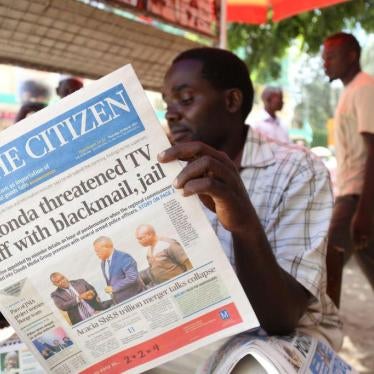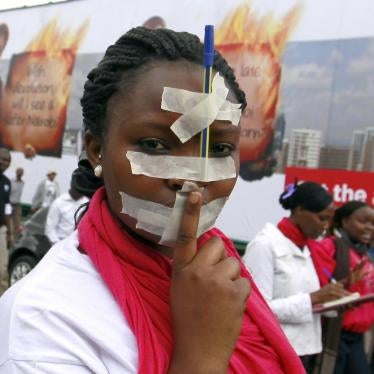Bob Rugurika, known throughout Burundi as Bob, is a promising young journalist. He is the director of the popular Radio Publique Africaine (RPA) radio station and is well known for his investigative journalism and easy interactive style.
He can comfortably chat with ministers and villagers alike. In the Burundian countryside, far from the capital, Bujumbura, RPA is often the first radio station people tune into for the latest news and debates.
Bob was arrested over a week ago. On January 20, the Bujumbura prosecutor summoned him to provide information about a series of investigative reports on the murder of three Italian nuns in a suburb in the capital city four months ago.
In a programme a few days earlier, RPA interviewed a man who claimed to have participated in the attack on the convent and who implicated senior officials from the state intelligence and security services. By that afternoon, the prosecutor had produced an arrest warrant for Bob and he was driven to Mpimba prison, in Bujumbura.
Two days later, he was transferred to Muramvya prison, about 30 kilometres away. He was initially held in isolation for one day, but the prison authorities lifted this restriction, and he has since been able to receive visits from his lawyers, colleagues, family and friends.
According to the prosecutor, interviewed by a Human Rights Watch researcher, Bob risks being charged with conspiracy to murder, obstructing justice, harbouring a criminal and failure to uphold public solidarity.
Bob should have been acknowledged for his contribution as opposed to facing a charge of “obstructing the course of justice.”
The Burundian government has previously used the allegation of interference with criminal investigations in an attempt to stop the media and human rights groups from publishing sensitive information and, in particular, names of alleged human rights abusers.
In 2012, government officials levelled a similar accusation against Human Rights Watch after it published a report on political killings. It is a convenient accusation in a country where the wheels of justice turn slowly and state agents commit violence with impunity.
Bob’s arrest is not about the search for justice for the gruesome murder of the three nuns. It is instead an attempt to prevent RPA from reporting on issues that the government does not want discussed. Muzzling the media is a common tactic in Burundi, and Bob and other journalists have been subjected to intimidation before.
In 2011, following mass killings in Gatumba, the authorities harassed Bob after RPA continued reporting on the attack despite a government ban on media coverage of the event.
As with the Gatumba killings — after which the defence minister called for unspecified “sanctions” on the media for violating the blackout — the government’s target in the aftermath of the murders of the nuns is once again the messenger.
Despite repeated intimidation, the Burundian media is among the liveliest in East Africa. Journalists put a premium on investigative reporting and value the right to information. RPA, with correspondents across the country, frequently reports on human rights abuses and corruption. But as the political space continues to shrink before elections in May, the government increasingly accuses journalists of being tools for the opposition.
Bob’s case, and the public response to his arrest, are strikingly reminiscent of another recent high-profile arrest in Burundi.
In May 2014, leading human rights activist Pierre Claver Mbonimpa was arrested and charged with endangering internal and external security after saying that young Burundians were being given weapons and sent for military training in the Democratic Republic of Congo. After four months in prison, due to serious illness, he was released on medical grounds. He still awaits trial.
Activists and journalists, in and outside Burundi, launched an international campaign in support of Mbonimpa, culminating in calls for his release by global political leaders, including US President Barack Obama, as well as the European Parliament.
Burundi has made important democratic gains since it emerged from decades of armed conflict, but the government risks undermining these gains if media freedom is not guaranteed and protected.
Burundi’s partners and friends should raise their voices for Bob Rugurika and for freedom of the media in Burundi. Locking up journalists who report on controversial issues should be decried for what it is — a crude means to stifle a free press, and one that won’t work.
Burundi risks democratic gains by undermining media freedom
Published in:
The East African
Your tax deductible gift can help stop human rights violations and save lives around the world.
Topic
Most Viewed
-
September 27, 2014
Guinea: 5 Years On, No Justice for Massacre
-
April 17, 2024
West Bank: Israel Responsible for Rising Settler Violence

-
April 27, 2021
A Threshold Crossed

-
November 25, 2019
A Dirty Investment

-
October 29, 2020
“I Sleep in My Own Deathbed”


